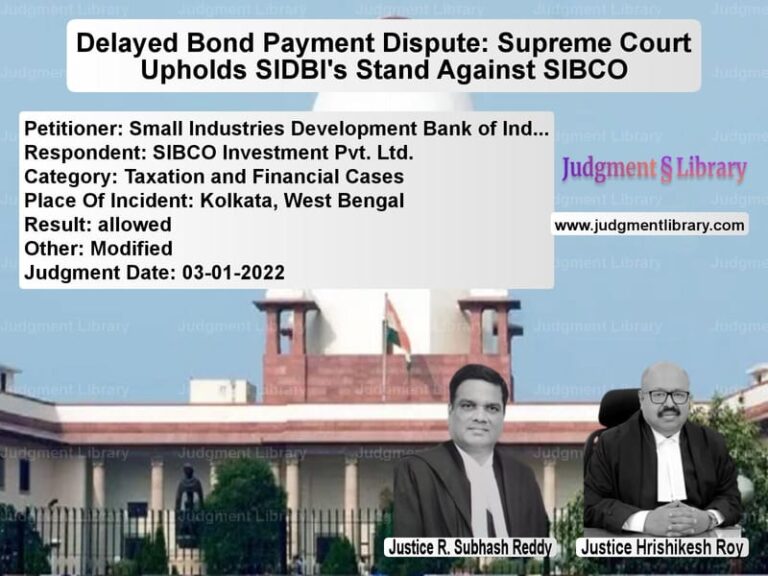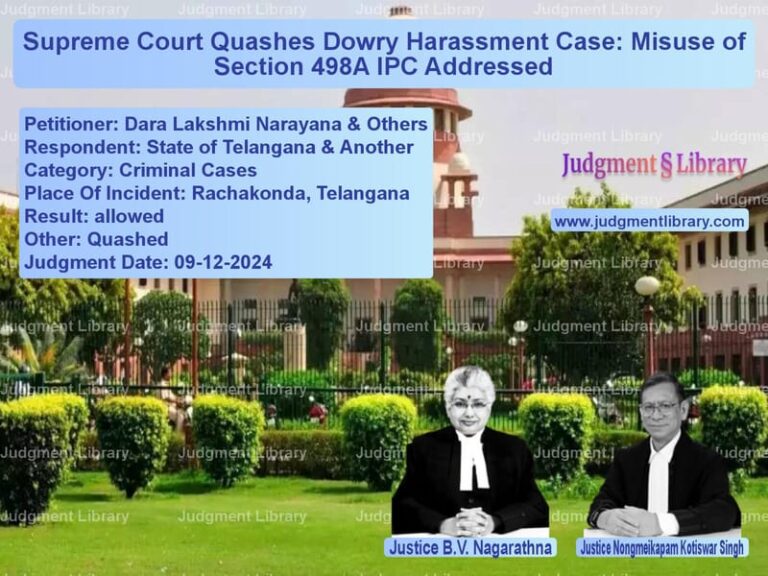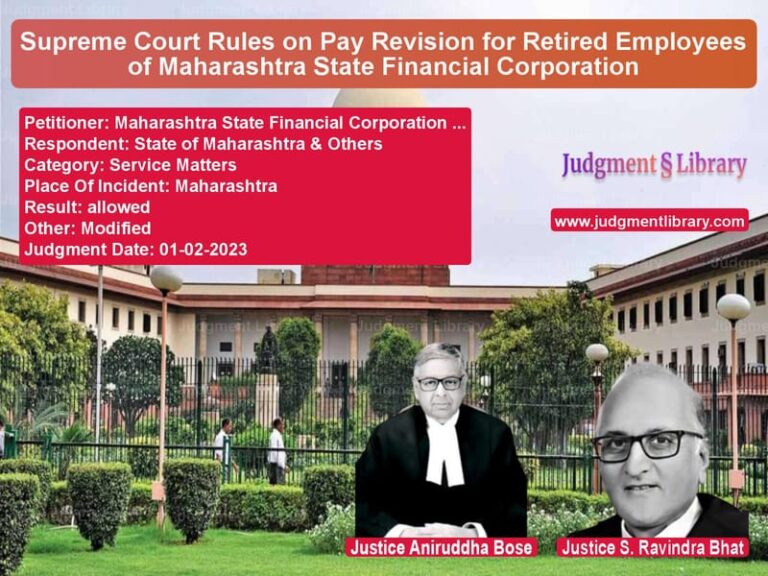Supreme Court Acquits Two Accused in NDPS Case Due to Lack of Evidence
The case of Bothilal vs. The Intelligence Officer, Narcotics Control Bureau revolves around the seizure of 5.067 kg of heroin from a hotel room in Chennai and the subsequent conviction of the accused under the Narcotic Drugs and Psychotropic Substances Act, 1985 (NDPS Act). The Supreme Court, after examining the evidence, ruled in favor of the accused and set aside their conviction, citing serious doubts regarding their possession of the contraband.
Background of the Case
On May 16, 2002, the Intelligence Officer of the Narcotics Control Bureau (NCB) received information that an individual involved in drug trafficking was staying in Chennai. Acting on this information, a team from the NCB conducted a raid on Hotel Suriya, Room No. 303, Periamet, Chennai. Inside the room, four individuals were found, including the appellants.
During the search, the officers found a blue rexine bag containing 5.067 kg of heroin. The accused were charged under Sections 8(c), 21(c), 27A, 28, and 29 of the NDPS Act. The trial court convicted the appellants and sentenced them to 11 years of rigorous imprisonment with a fine of ₹1 lakh each, which was later reduced to 10 years by the Madras High Court.
Challenging their conviction, the accused approached the Supreme Court.
Legal Issues Before the Court
- Whether the confessional statements of the accused recorded under Section 67 of the NDPS Act were admissible as evidence.
- Whether the prosecution had sufficiently proved that the accused were in possession of the contraband.
- Whether procedural lapses in the seizure and sampling of the narcotics vitiated the conviction.
Arguments by the Petitioner (Accused – Bothilal & Another)
The appellants’ counsel raised several critical objections:
- “The confessional statements of the accused under Section 67 of the NDPS Act were inadmissible as they were recorded by officers who are considered ‘police officers’ under the law.”
- “The alleged seizure occurred in a room booked by a different accused, not the appellants, making it unclear whether they had possession of the contraband.”
- “The search and seizure process violated Section 50 of the NDPS Act, as the accused were not informed of their right to be searched in the presence of a Gazetted Officer.”
- “Independent witnesses to the seizure were not examined in court, raising doubts about the credibility of the NCB’s claims.”
Arguments by the Respondent (Narcotics Control Bureau)
The prosecution defended the conviction, stating:
- “The presence of the accused in the hotel room along with the bag containing heroin indicated their involvement.”
- “Even if confessional statements were excluded, the testimony of official witnesses was sufficient to establish guilt.”
- “Failure to examine independent witnesses does not automatically invalidate a conviction if strong circumstantial evidence exists.”
- “The accused were apprehended at the scene of the crime, making their possession of the contraband a reasonable inference.”
Supreme Court’s Analysis and Judgment
The Supreme Court carefully reviewed the evidence and legal precedents, making the following key observations:
- “The confessional statements of the accused recorded under Section 67 of the NDPS Act are inadmissible as evidence in light of the ruling in Tofan Singh vs. State of Tamil Nadu.”
- “The prosecution failed to prove beyond a reasonable doubt that the appellants were in conscious possession of the narcotics.”
- “Independent witnesses to the seizure were not examined, which weakens the prosecution’s case.”
- “The failure to follow proper sampling and procedural safeguards creates serious doubts about the integrity of the evidence.”
The Court ruled:
“The conviction of the appellants cannot be sustained due to serious doubts regarding their possession of the contraband and procedural irregularities in the investigation.”
Key Takeaways from the Judgment
- Confessional statements made to NCB officers under Section 67 of the NDPS Act are inadmissible.
- The prosecution must prove conscious possession of narcotics beyond a reasonable doubt.
- Failure to examine independent witnesses weakens the prosecution’s case.
- Non-compliance with procedural safeguards can lead to acquittal in NDPS cases.
Impact of the Judgment
This ruling is a landmark decision in NDPS jurisprudence, reinforcing the requirement of strict adherence to procedural safeguards in drug-related cases. The Court emphasized that convictions under the NDPS Act must be based on clear, legally admissible evidence, and that confessional statements recorded by NCB officers cannot be relied upon.
By setting aside the conviction, the Supreme Court reaffirmed the principle that mere presence at the scene of the crime does not establish guilt. This decision will likely impact future NDPS cases, where procedural compliance and evidentiary integrity are critical to securing convictions.
Petitioner Name: Bothilal.Respondent Name: The Intelligence Officer, Narcotics Control Bureau.Judgment By: Justice Abhay S. Oka, Justice Rajesh Bindal.Place Of Incident: Chennai, Tamil Nadu.Judgment Date: 26-04-2023.
Don’t miss out on the full details! Download the complete judgment in PDF format below and gain valuable insights instantly!
Download Judgment: bothilal-vs-the-intelligence-off-supreme-court-of-india-judgment-dated-26-04-2023.pdf
Directly Download Judgment: Directly download this Judgment
See all petitions in Drug Possession Cases
See all petitions in Bail and Anticipatory Bail
See all petitions in Custodial Deaths and Police Misconduct
See all petitions in Fraud and Forgery
See all petitions in Attempt to Murder Cases
See all petitions in Judgment by Abhay S. Oka
See all petitions in Judgment by Rajesh Bindal
See all petitions in allowed
See all petitions in Quashed
See all petitions in supreme court of India judgments April 2023
See all petitions in 2023 judgments
See all posts in Criminal Cases Category
See all allowed petitions in Criminal Cases Category
See all Dismissed petitions in Criminal Cases Category
See all partially allowed petitions in Criminal Cases Category







